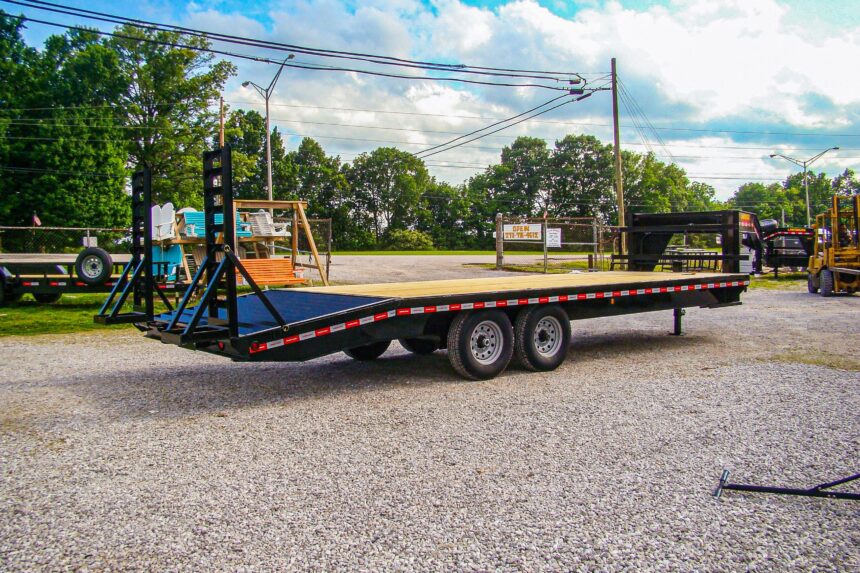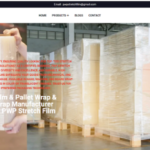When it comes to trailer rentals, selecting the right type can make all the difference in the success of your project. Among the most popular options are flatbed trailers and enclosed trailers, each offering distinct advantages depending on the nature of the task. Whether you’re moving equipment, hauling vehicles, or transporting valuable goods, understanding the key differences between these trailer types is essential for making an informed decision.
This article explores the unique features, benefits, and ideal use cases for flatbed and enclosed trailers, helping you choose the perfect solution for your hauling needs.
Understanding Flatbed Trailers
Flatbed trailers are open-deck trailers without walls or a roof. Their open design provides a high level of accessibility, making them ideal for transporting oversized or oddly shaped items.
Key Features of Flatbed Trailers:
- Open Deck Design: Allows easy loading and unloading from any angle.
- High Weight Capacity: Suitable for heavy-duty loads like machinery or building materials.
- Versatility: Can handle items that wouldn’t fit in an enclosed space.
Flatbed trailer rentals are particularly popular in construction, agriculture, and logistics industries, where bulky cargo is a common challenge.
Understanding Enclosed Trailers
Enclosed trailers, on the other hand, come with a covered structure that fully encloses the cargo space. This design offers added protection from weather and theft, making them a preferred choice for transporting sensitive or valuable items.
Key Features of Enclosed Trailers:
- Weatherproofing: Protects cargo from rain, snow, and sun exposure.
- Enhanced Security: Lockable doors keep items safe during transit or storage.
- Ample Interior Space: Ideal for moving items that require careful handling.
These trailers are commonly used in moving household goods, storing equipment, or transporting electronics and furniture.
Comparing Flatbed and Enclosed Trailers
Choosing between a flatbed and an enclosed trailer depends on several factors, including the type of cargo, the nature of the trip, and your specific requirements. Let’s break it down further:
1. Cargo Type
- Flatbed Trailers: Best for heavy machinery, building materials, or vehicles that can endure exposure to the elements.
- Enclosed Trailers: Ideal for sensitive goods like electronics, antiques, or items requiring secure storage.
2. Accessibility
- Flatbed Trailers: Offers easier loading and unloading from multiple angles, making them efficient for oversized items.
- Enclosed Trailers: Loading is limited to the rear or side doors, which may require more time for certain tasks.
3. Weather Protection
- Flatbed Trailers: Lack weatherproofing, so goods are exposed to rain, snow, and debris.
- Enclosed Trailers: Provide complete protection from adverse weather conditions, making them ideal for long-distance hauls.
4. Cost
- Flatbed Trailers: Generally more affordable due to their simpler design.
- Enclosed Trailers: Higher rental costs but offer added security and protection.
When to Choose a Flatbed Trailer
Flatbed trailers are well-suited for projects that require flexibility and ease of loading.
Ideal Use Cases:
- Construction Projects
Haul materials like lumber, steel beams, and scaffolding directly to your worksite. - Machinery Transport
Move tractors, skid steers, or other heavy equipment with ease. - Vehicle Hauling
Transport cars, motorcycles, or boats that don’t require enclosed protection. - Large-Scale Deliveries
Deliver oversized goods, such as industrial pipes or large furniture, efficiently.
The open deck design of flatbed trailers ensures that you can easily accommodate irregularly shaped items without worrying about height or width restrictions.
When to Choose an Enclosed Trailer
Enclosed trailers excel in situations where protection and security are paramount.
Ideal Use Cases:
- Residential Moving
Securely transport furniture, electronics, and household items without worrying about weather damage. - Business Transport
Move sensitive equipment, documents, or inventory for commercial purposes. - Recreational Use
Safely haul motorcycles, ATVs, or sports equipment to your destination. - Storage on the Go
Use as a temporary storage solution for events or seasonal projects.
With their lockable design and protective enclosure, these trailers offer peace of mind for anyone transporting valuable or delicate cargo.
Choosing the Right Trailer for Your Vehicle
Your towing vehicle plays a crucial role in determining which type of trailer is best for your needs.
Factors to Consider:
- Towing Capacity: Ensure your vehicle can handle the weight of the loaded trailer.
- Hitch Compatibility: Verify that your towing vehicle’s hitch matches the trailer type.
- Braking Systems: Some trailers require a connection to the vehicle’s braking system for safe operation.
For example, flatbed trailers tend to be lighter, which may make them a better fit for smaller vehicles. Conversely, enclosed trailers are heavier and may require a more robust towing setup.
Safety Tips for Using Flatbed and Enclosed Trailers
Regardless of the trailer type, safety should always be a priority.
Flatbed Trailer Safety:
- Secure Your Load: Use heavy-duty straps or chains to keep cargo in place.
- Distribute Weight Evenly: Avoid overloading one side to maintain balance.
- Protect Cargo: Use tarps or covers to shield items from weather and debris.
Enclosed Trailer Safety:
- Inspect Locks and Latches: Ensure doors are securely locked before starting your journey.
- Check Tire Pressure: Proper tire maintenance reduces the risk of blowouts.
- Load Strategically: Place heavier items on the bottom and distribute weight evenly.
By following these tips, you can minimize risks and ensure a safe hauling experience.
Renting vs. Owning a Trailer
For many individuals and businesses, renting is the more practical option compared to purchasing a trailer outright.
Benefits of Renting:
- Cost Savings: Avoid the high upfront costs and ongoing maintenance of ownership.
- Flexibility: Access the right trailer for each project without being limited to one type.
- Convenience: Rental companies handle upkeep, ensuring you always get a well-maintained trailer.
Roadmoto Trailer Rentals offers a variety of flatbed and enclosed trailer options to meet diverse transport needs. Whether you’re moving heavy machinery or delicate household goods, renting allows you to find the perfect fit for your specific requirements.
Conclusion
Flatbed and enclosed trailers each have their strengths, making them suitable for different tasks. By understanding the unique features and benefits of both types, you can select the trailer that best matches your project’s needs.
Flatbed trailers are ideal for oversized, heavy-duty loads that require easy accessibility, while enclosed trailers provide superior protection and security for sensitive or valuable items.
With options from providers like Roadmoto Trailer Rentals, you can confidently choose the right trailer for any job. Whether you’re working on a construction site, moving homes, or transporting recreational gear, the right trailer makes all the difference.


